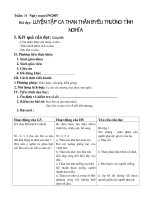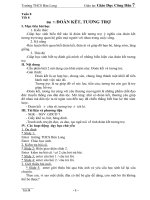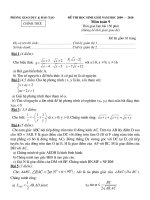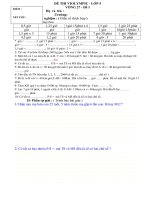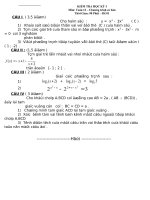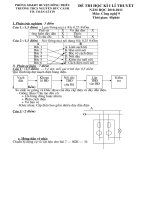Bài giảng Đề Tham Khảo
Bạn đang xem bản rút gọn của tài liệu. Xem và tải ngay bản đầy đủ của tài liệu tại đây (201.89 KB, 3 trang )
ĐỀ THI HỌC SINH GIỎI LỚP 9
I. VOCABULARY
A. Circle the letter (A, B, C or D) next to the word or phrase which best completes each sentence.
1. It's a good idea to see your doctor regularly for ................... .
A. a revision B. a control C. an investiagation D. a check-up
2. Last year the potato harvest was very disappointing, but this year it looks as though we shall have a better ................... .
A. product B. outcome C. amount D. crop
3. When the starter gave the ................... all the competitors in the race began to run round the track.
A. signal B. warning C. shot D. show
4. ................... from Bill, all the students said they would go
A. Except B. Only C. Apart D. Separate
5. The new manager explained to the staff that she hoped to ................... new procedures to save time and money.
A. manufacture B. establish C. control D. restore
6. There is a fault at our television station. Please do not .................... your television set.
A. change B. adjust C. repair D. switch
7. The crowd at a football match are often ................. .
A. excite B. excited C. exciting D. excitement
8. I'm very .................... in the information you have given me.
A. concerned B. surprised C. bored D. interested
9. I saw a thief take Peter's wallet so I ran ................... him, but I didn't catch him.
A. into B. after C. over D. near
10. If it's raining tomorrow, we shall have to................... the match till Sunday.
A. put off B. cancel C. play D. put away
B. Read the text below. Use the word given in capitals at the end of each line to form a word that fits in the space in the same line.
Kids watch more TV
A study into children's television (0) viewing habits reveals VIEW
that children whose parents have a high level of (1) _________________ EDUCATE
tend to watch less television than children from less educated
family(2) ________________ . The report also suggests that a high rate of BACK
TV watching among children in poorer (3) _________________ areas SUBURB
and in the provinces, compared to those living in large urban centres,
is often due to (4) _________________ and a lack of other kinds of POOR
(5) _________________ in the area. Disco, cinema, theatre and sports ENTERTAIN
(6) ________________ offer children in urban centres a wider range ACTIVE
of pastimes, which leads to far (7) ______________ hours being spent FEW
in front of the box. (8) ______________, comedies and adventure films COMMERCE
are children's (9) _______________ programmes, while twenty per cent FAVOUR
of children said they preferred (10) _______________ films and thrillers. VIOLENCE
C. Match each phrasal verb with the correct definition
1. fill in
2. turn into
3. go away
4. put away
5. run out of
6. get away with
7. join in
8. pick out
9. keep on
10. get over
A. participate
B. avoid punishment
C. select, choose
D. change into, become
E. continue
F. complete (a form)
G. leave
H. recover from
I. use up completely
J. return something to its correct place
II. GRAMMAR
A. Use the correct forms of the verbs in the brackets to complete the passage below.
I (write) (1) ....................................... to express my dissatisfaction of my stay at the Lord Hotel in London last weekend. I (book)
(2) ...................................... the hotel in Sweden and also (receive) (3) ............................. information about the hotel. I (promise)
(4) ................................ a luxury weekend. However, I (be) (5)..................................... not satisfied. The room was comfortable, but the traffic
from the road opposite the hotel (make) (6) .................................... it impossible to (sleep) (7) ............................ I (ask)
(8) ...................................... for another room, but no single rooms (be) (9) ................................. available. I required room-service one night
and I (have) (10) .................................. to wait for almost one hour before someone came.
B. Complete the sentences with the correct prepositions
1. She was very conscious (1).................. her lack of experience on her first day at work.
2. He has a new solution (2).................. the problem.
3. Nobody helped him. He managed it (3).................. his own.
4 The drivers (4) ................... London kept their cars (5) ............... the left.
5. The summer holiday is coming. We are all excited (6) ................. going (7) ............. a long trip
(8) ............ the South.
6. The children were amazed (9) .................... the lion show at the circus.
7. Her small garden looks very beautiful in spring because all the flowers are (10) .................... full bloom.
III. READING:
A. Put ONE suitable word in each space
Miss Darby was one of those people who never threw anything away. “You never know when you might need it” was
(1) ...................................... of her favourite sayings. She lived (2) ...................................... herself in a large Victorian house across the road
from us. Although I never went to her house, I knew it was full (3) ...................................... antique furniture, Persian carpets and so on. In
every room, there were dozens of paintings so that her house was (4) ...................................... an art gallery. I remember my father
(5) ...................................... that she was a “ Straffordshire Darby” but I had (6) ...................................... idea what he meant. I
(7) ...................................... out years later that the Darby family had made their money from coal-mining in Straffordshire. We used to make
up stories (8) ...................................... her. My sister Alice, (9) ...................................... was a romantic girl, told us that Miss Darby once had
a lover, but he walked out one day and she (10) ...................................... saw him again!
B. Read the passage and decide which is the best answer. Circle the letter A, B, C or D next to the word you choose.
Paper is named for papyrus, a reed like plant used by ancient Egyptians as writing material more than 5000 years ago. The Chinese
invented the paper that we use 2000 years ago.
A piece of paper is really made up of tiny fibers, unlike a piece of material. The fibers used in paper, however, are plant fibers, and
there are millions of them in one sheet. In addition to the plant fiber, dyes and additives such as resin may be used. Dyes can make the paper
different colours; resin may add weight and texture.
Where do these fibers come from ? The majority of paper is made from the plant fiber that comes from trees. Millions are cut down,
but new trees are planted in their place. Paper may be also made from things like old rags or pieces of cloth. Wastepaper, paper that has been
made and used, can be turned into recycled paper. This recycling process saves forest, energy and reduces air and water pollution.
1. According to the passage, the paper that we use was first invented by
A. the Chinese B. the Egyptians C. ancient cultures D. foresters
2. What is the main ingredient in most paper?
A. resin B. cardboard C. plant fiber D. papyrus
3. According to the passage, the primary source of the plant fiber used in paper is
A. rags B. trees C. fabric D. wastepaper
4. According to the passage, recycling paper is
A. bad for the environment C. good for the environment
B. wasteful D. economical
5. According to the passage, recycling paper does all of the following EXCEPT
A. reduce the need for ink C. save energy
B. save forests D. reduce air pollution
IV. WRITING
A. Rewrite each sentence beginning as shown, so that the meaning remains the same.
1. The keepers feed the lions at 3 pm every day. The lions…………………………………………………...
2. We got lost because we didn't have a map. If we……………………………………………………….
3. I would prefer you to deliver the sofa on Friday. I would rather……………………………………………..
4. The bridge was so low that the bus couldn't go under it. It was……………………………………………………..
5. That was a silly thing to say. What………………………………………………………
6. We've run out of tea. There………………………………………………………
7. I last saw him when I was a student. I haven't…………………………………………………..
8. Susan was too excited to sleep. Susan was…………………………………………………
9. Robert has not had a job for two years. Robert has been…………………………………………..
10. She will complete the work only she is paid extra. She will not………………………………………………
B. Use the words in the brackets to combine the following sentences.
1. All the students love the principal. He is very kind. (because of)
2. I have forgotten the tickets. I’m sorry for it. (having)
3. I saw it with my own eyes. I believed it. (if)
4. The house at the end of the street has been sold. It has been empty for years. (which)
5. It's a pity he doesn't take the doctor's advice. (wish)
I. VOCABULARY: (30 points)
Part 1: (10 points)
Q# 1 2 3 4 5 6 7 8 9 10
Key D D A C B B B D B A
Part 2: (10 points)
1. education 2. backgrounds 3. suburban 4. poverty
5. entertainment 6. activities 7. fewer 8. Commercials
9. favourite 10. violent
Part 3: (10 points)
Q# 1 2 3 4 5 6 7 8 9 10
Key F D G J I B A C E H
II. GRAMMAR: (20 points)
Part 1: (10 points)
1) am writing 2) booked 3) received 4) was promised 5) am not
6) made 7) sleep 8) asked 9) were 10) had
Part 2: (10 points)
1) of 2) to 3) on 4) in - to 5) about - on - to 6) at 7) in
III. READING: (25 points)
Part 1: (10 points)
1. one 2. by 3. of 4. like 5. saying
6. . no 7. found 8. about 9. who 10. never
Part 3: (10 points) 2 points for each correct answer
1. A. 2. C. 3. B. 4. C. 5. A.
IV. WRITING: (25 marks)
Part 1: (10 points)
1. The lions are fed at 3 pm every day
2. If we had had a map, we wouldn't have got lost
3. I would rather you delivered the sofa on Friday.
4. It was such a low bridge that the bus couldn't go under it.
5. What a silly thing to say!
6. There isn't any tea left.
7. I haven't seen him since I was a student.
8. Susan was so excited that she couldn't sleep.
9. Robert has been out of job/ jobless/ unemployed for two years.
10. She will not complete the work unless she is paid extra/ if she is not paid extra.
Part 2: (5 points)
1. All the students love the principal because of his kindness.
2. I’m sorry for having forgotten the tickets.
3. If I hadn’t seen it with my own eyes, I wouldn’t have believed it.
4. The house at the end of the street which has been empty for years has been sold.
5. I wish he took the doctor's advice.
